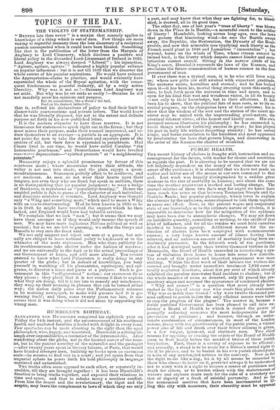TOPICS OF THE DAY.
THE VIOLETS OF STATESMANSHIP.
"BETTER late than never" is a maxim that scarcely applies to knowledge of a thing which is out of date. Few things are more vexing to regretful memory than the late discovery of a reciprocal passion unsuspected when it could have been blessed. Something like that is the publication of the letter from the Marquis of Anglesey- to Lord Cloncurry, which discloses a positive . and liberal policy in the discarded Lord-Lieutenant of Ireland in 1835. Lord Anglesey was always deemed " Liberal " ; his injunction, "Agitate, agitate, agitate : " indicated a highly popular reliance on popular influences : but it is not till 1849 that we discover the whole extent of his popular aspirations. He would have reduced the Appropriation-clause to practice, and would evidently have superseded the whole of the Repeal agitation, with the conse- quent hinderances to peaceful industry, all by a truly active liberality. Why was it not 80 ?—Because Lord Anglesey was set aside. But why was he set aside so easily I—Because be did not manfully avow his opinions and purpose, But let concealment, like a worm r the bud, Feed on his damask tablecloth;
that is, suffered his declarations of policy to find their limit in dinner-table conversations and private letters. The world knew that he was liberally disposed, but not to the extent and definite purpose set forth in his now-published letter. It is the modern etiquette to have these reserves. It is not bienseance for statesmen to speak right out in the forum ; but they must mince their purpose, make their counsel impersonal, and re-
duce themselves to an average—a particle in an aggregate. is• not polite for men to take the distinct and separate parts of the orators of old, but their force is expended in periphrasis. Had Cicero lived in our time, he would have called Cataline "the honourable gentleman," and Demosthenes would have levelled rose-water deprecations—" spirited protests" at "a neighbouring potentate."
Mediocrity enjoys a splendid prominence by favour of this courteous mode ; where mountains waive their altitude, the valley is not cast into shade, and the plain enjoys a quasi- mountainousness. Statesmen politely affect to be mediocre, and are mediocre. As men do not wear their hearts upon their tongues, not even they who are frank but speak in uniform, there is no distinguishing trait for popular judgment : to wear a badge of frankness, is reprobated as "popularity-hunting." Hence the unaided public is fain teguess at the character of each individual, and desperate mistakes it commits. Lord Anglesey was thought only "a Whig and something more," which used to mean a Whig with an eye to electioneering. Had he been known in 1835 as he is in 1849, he might have received the support which he then lacked, and England would have had valuable services.
We complain that we lack " men "; but it seems that we may have them amongst us if they would only resume the speech of men. We may have mute inglorious Miltons political as well as poetical ; but as we are left to guessing, we suffer the Greys and Russells to step into the front rank.
We not only support and reject our men at a guess, but act- ually are obliged to leave national policy to haphazard or to the whimsies of the mute statesmen. Men who shun publicity for its troublesomeness take shelter under the fashion of reserves ; and we are universally in the dark as to the actual proceedings of our Government at home, and still more abroad. You cannot pretend to know what Lord Palmerston is really doing in any quarter of the globe ; but in default of knowledge, you busy yourself in watching all his pleasantries, equivoques, and epi- grams, to discover a sense and guess at a purpose. Such is go- vernment in this "self-governed" nation : our statesmen do as they please ; they plead that it is not comme ii faut to explain what they are doing, till it is too late to remedy any mischance; they wrap up their meaning in phrases that can be turned either way; the nation daily pores over the Parliamentary columns in its morning newspaper, to make wild guesses how it is go- verning itself; and then, some twenty years too late, it dis- covers that it was doing what it did not mean by supporting the Wrong men.


























 Previous page
Previous page